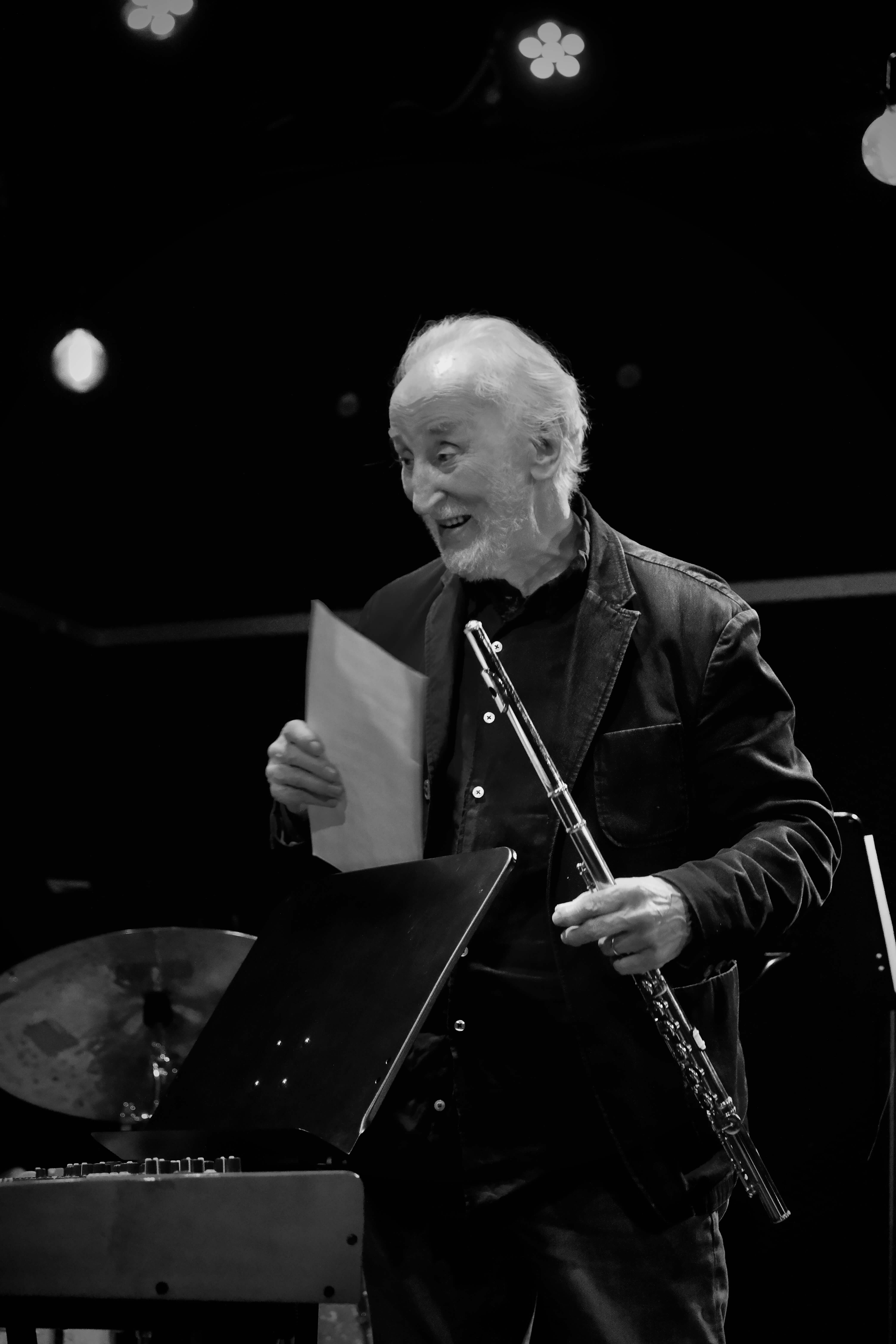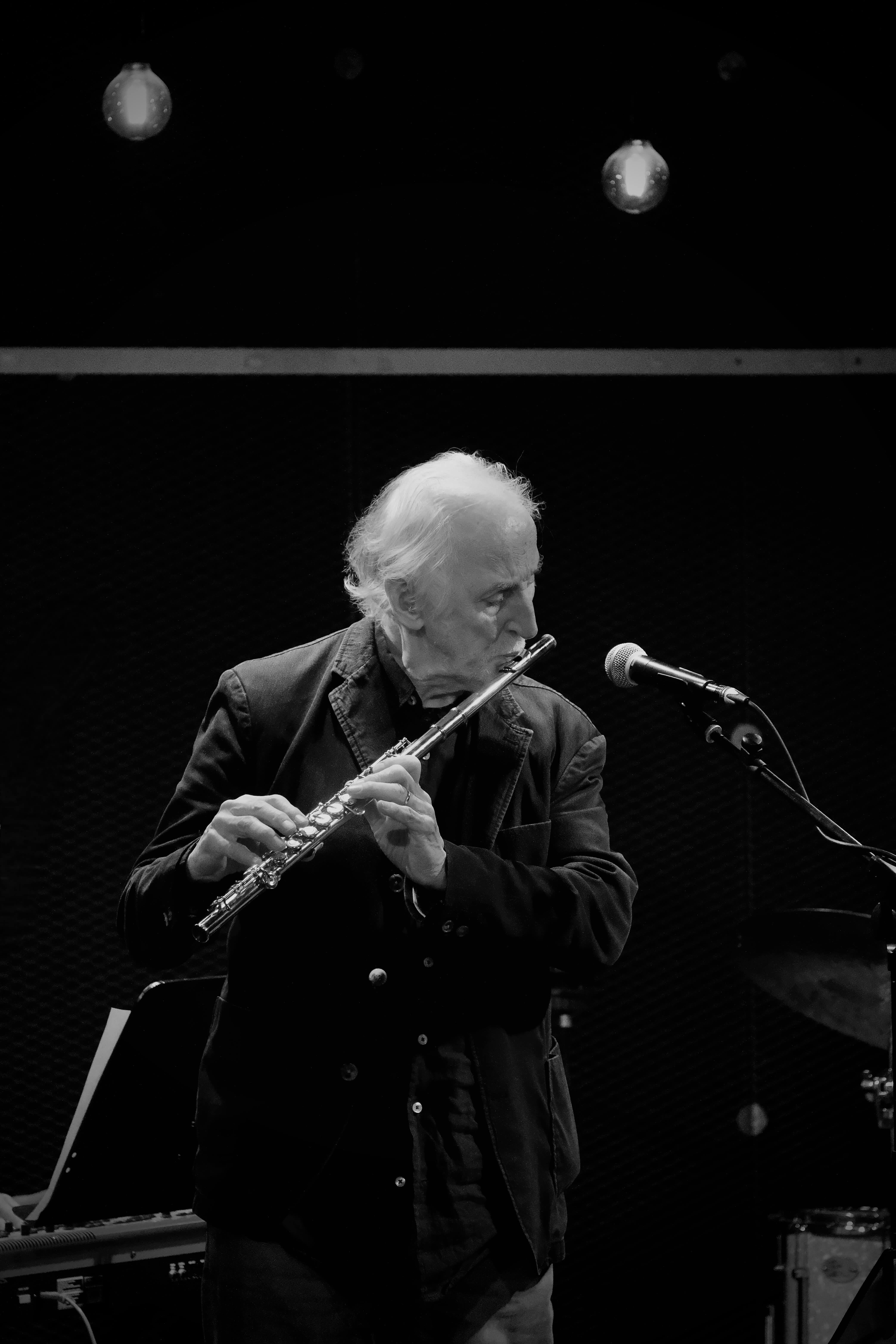Juhani Aaltonen feels young. It is hard to describe it exactly, but something about his aura is almost unnaturally fresh given his age, 89 going on 90 this December. That being said, having the Finnish jazz legend around and still active shouldn’t be taken as a given.
“I got Covid really bad in 2022,” Aaltonen says. “In fact, it was so bad, that one point I wished I would die, I just couldn’t take it any longer. My survival was a matter of hours.”
The dramatic events following the world-changing infection left their mark on the artist, who had to give up playing the saxophone for good because its physical demands have now become dangerous. The blowing of the horn generates pressure in the brain, which in the present circumstances could be too much. Thankfully, playing the flute is still OK, and Aaltonen mentions having found a whole new level in approaching the instrument, which is often the second choice for saxophonists.
“For me the flute is the main thing now, and I’m heeding the advice from my late friend Esa Pethman, who used to say that you should blow the flute like you would be blowing into an empty bottle to make the humming sound we all know. It’s actually interesting that there are so few musicians in jazz concentrating on the flute,” he says.

From session player to avantgarde pioneer
Before the mandatory shift of focus ‘Junnu’, as he is affectionately known to the world at large, had decades to leave an everlasting impact on the world of music as a saxophonist. In fact, he is one of the most recorded Finnish musicians in history, with credits on more than 3,500 tracks in the Finnish copyright system Gramex.
“I started out as a session musician, which I regard as very good education for understanding many kinds of music and how to approach each situation,” Aaltonen remembers.
From there on, his journey took him into the deep end of the local jazz circles and all the way into the annals of Finnish avantgarde with the likes of local greats such as Edward Vesala, Otto Donner and Heikki Sarmanto. Sarmanto, in particular, has remained a close friend and a key collaborator to Aaltonen all these years and counting.
The latest Sarmanto & Aaltonen album came out recently on the internationally lauded Finland-based Jazzaggression label. Just Us, a duo record of Sarmanto on the cosmic-vibed Roland D77 keyboard and Aaltonen on the flute, continues the long story of the two in fine form, adding to what was heard on the 2009 duo album Conversations, a key album in both their catalogues.
“When Heikki and I play together, it just flows very naturally,” Aaltonen confirms. Sarmanto adds in the album’s liner notes: “We are spiritually connected. I owe Juhani so much – no one can interpret my songs like he does. (…) I thought about Juhani and his flute, and the themes started to flow.”
Juhani Aaltonen’s recording history includes several seminal Finnish jazz works on the iconic Love Records label and proggier adventures in the ranks of Tasavallan Presidentti, plus much more. He recorded lesser known hard-hitters Prana (with Reggie Workman on bass) and Springbird (with the percussion group Senegalese Drums) for the Finnish Leo Records label run by Edward Vesala and Iro Haarla in the 1970s. Aaltonen’s collaboration with the eccentric local contemporary free jazz group PLOP won the Emma award as the best album in2024. To put it in brief, and in sports terms, Aaltonen’s ‘stats’ are pretty much unmatched. His status in Finnish music is that of a stone-cold legend, a scene stalwart and an icon.
Rediscovering old recordings, finding new spirals
When faced with his own extensive influence, Aaltonen himself remains characteristically humble. “I was away from the jazz circles for many years along the way, and I didn’t really think anybody knew me anymore or that anybody would be interested in my music,” he shrugs.
On the contrary: a whole new generation of musicians and listeners has embraced Aaltonen’s music in the current millennium. His pace of performing may have slowed down, but perhaps that very factor has brought with it an aura of a special event whenever ‘Junnu’ appears on stage. In an era defined by a newly-found awareness and appreciation of ‘spiritual jazz’, it is only natural that Aaltonen’s key works are recognised for what they are: monuments of deep, devotional jazz music.
“I’ve been listening to some of the old work myself lately,” Aaltonen says. “For example, on the Prana album I was very scared to play. I mean, think about it: Reggie Workman was there! A legend. It’s like being on the stage with a lion. And you have to find a way to communicate with the lion or he will eat you up alive! I didn’t listen to the record for a long time because I was so unsure of how I played.”
Juhani Aaltonen, Reggie Workman and Edward Vesala, recorded live at the club Groovy, Helsinki, August, 1981.
He went back to the recordings when working on the 2003 trio album Mother Tongue, to find that suddenly it all made sense.
“I discovered that there is a spiral in my music,” Aaltonen says, outlining a growing circle on the table with his index finger. “The spiral grows, the music expands, yet the tonal intensity remains. For me, there needs to be intensity and tonal connection in free jazz and improvised music. Even if you would trek well outside of the structure at times, the tonal tension keeps it all together and evolving.”
Aaltonen would also study this concept with the late Edward Vesala, organising duo practice sessions that could go on for hours with the goal of investigating what tension and prolonged intensity could do in improvised music. "Sometimes I could solo for up to 90 minutes when playing with Edward, we would just go on and on," Aaltonen says.
Key collaborations
The ‘lion’, bass legend Reggie Workman, gave his approval too by signing up to work with Aaltonen again in 2004, this time for the Helsinki-based TUM Records label, run by Petri Haussila, a key operator on the Finnish free jazz scene due to his production and label management work. The album Reflections also features Andrew Cyrille, a legendary percussionist in the US avantgarde jazz sphere. As it happens, Haussila was also the producer of the Prana session, recorded live at the now long defunct jazz club Groovy in downtown Helsinki — another reflection of Junnu’s many productive long-standing artistic relationships quietly yielding quality work over decades. It seems that things have been brewing steadily all along with several key actors on the local scene, always just left of the limelight.
Pianist / harpist Iro Haarla also deserves a mention of her own in the Aaltonen legacy, perhaps with bold capital lettering. The way Aaltonen describes Haarla’s vision is crafting music with a remarkably delicate vision.
“I could play the same composition as a duo with Heikki and Iro and they would approach it from completely different angles,” Aaltonen says. “Heikki would play very vividly and fill the space with notes, whereas Iro would achieve greate motional effect with just a few notes.”
Aaltonen and Haarla’s interplay is on fine display on Kirkastus (2015, TUM Records), a beautiful album of ten introspective pieces. It is no coincidence that Aaltonen’s work during the past decades especially resonates with deep spiritual harmony: he found God in 1986 and was away from the immediate jazz circles for quite a long time, mostly appearing at religious events. The impetus to ‘return’ to the jazz world came from both the newly found interest in Aaltonen’s music by younger generations and his audience and immediate religious circles.
“I was told I should get out there more and spread my message, share what I have to give,” Junnu remembers. “I wasn’t sure anyone was interested in me anymore, but I’m glad I was wrong there.”
One of the younger generation players that has collaborated with Aaltonen frequently is bassist Ville Herrala, also a member of PLOP. “To play with Junnu is to enter a world of his own, ideally just going with the flow,” Herrala says. “Sometimes it works like wonder with Junnu, and at its best what follows is very direct and something that’s not just ‘music’, but ‘life’ in a broader sense. Junnu is very honest, and he expects that from others as well. I remember occasions playing with him when I have felt that the music just starts happening on its own through us.”
One of the seminal groups that Aaltonen played an important early part in is UMO Helsinki Jazz Orchestra, founded in 1975 and celebrating their 50th anniversary this year. UMO was initially an independent musicians’ collective building around Heikki Sarmanto and Esko Linnavalli, and Aaltonen was also part of the founding meeting. He describes the early UMO as a “wild bunch,” unpredictable and raw. Aaltonen was a member of the UMO for its first ten years of operation. “Nowadays the orchestra is more like a high-quality Swiss watch, functioning in perfect harmony and able to play anything they want.”
Roads not taken
Given Juhani Aaltonen’s extensive body of work, it feels surprising he is not more internationally renowned. In addition to his work with the Finnish greats of various eras, there are also stone-cold classics like Hot Lotta (1973, Blue Master Special), where Aaltonen and drummer Edward Vesala collaborate with German free jazz masters Peter Brötzmann (saxophones) and Peter Kowald (bass). The album was recorded at Finnvox Studios in Helsinki, marking a rare occasion of international jazz stars travelling to Finland to record a studio album.
“That was a wild session,” Aaltonen says. “I really had to learn how to play free then to keep up with Brötzmann and Kowald. Brötzmann instructed me to not play when he’s soloing, saying ‘after I finish, then it’s your turn’.”
The quartet also took to the road, playing around Finland during a small tour. Their van lost one of its tyres near Jyväskylä, but help was at hand:
“With Edward, we were just wondering about what had happened, when we saw that the two German musicians had already jumped out of the van with supreme efficiency and as we stepped out, they had pretty much already changed the flat tyre,” he laughs.
For Aaltonen, opting out of the wider international realm was a choice he made when the opportunity presented itself. Manfred Eicher, the main producer and curator of the illustrious ECM label based in Munich, approached Junnu after being impressed with the saxophonist’s work with the Norwegian bassist Arlid Andersen’s quartet. Aaltonen felt that he’s not ready to take on Eicher’s proposal and refused the offer to record for the label, which could have no doubt uplifted his international profile quite extensively.
“Back then, it perhaps felt like a too big a step to take, and I wasn’t bold enough,” Aaltonen reflects. What would he do now, after having all the experience of the subsequent decades to draw from? What would his advice be for young Junnu thinking about the ECM offer? The answer comes quickly: “Do It! Just go! What are you waiting for?
Juhani Aaltonen 90 years, 18.11.2025 19.00 Savoy Theatre, Helsinki
Sources
Hannu Luntiala: Juhani Aaltonen – Jazzia jumalan armosta (Aviador, 2017)
Featured photo: Johanna Hjorth
